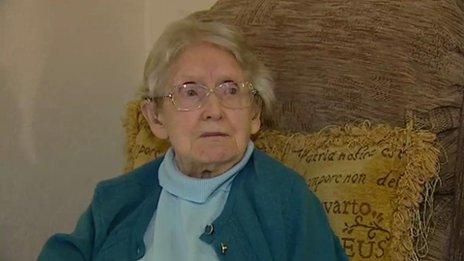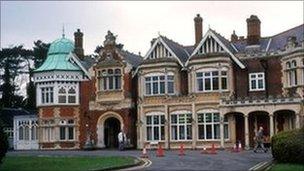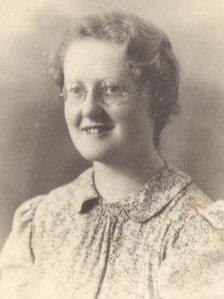Bletchley code-breaker Mair Russell Jones talks of war
- Published

Mair Russell Jones was studying for a degree in music, Welsh and German at Cardiff University when she was selected for a secret mission
Sipping tea in her Caerphilly living-room, 94-year-old Mair Russell Jones seems the sort of kind and charming old lady who everyone would like to have as a grandmother.
Yet for over 50 years Mair hid the truth about how her wartime work helped to shorten World War II by anything up to four years, and saved countless thousands of lives on both sides of the conflict.
Now, to coincide with a BBC Wales documentary on the unsung heroes of the Government Code and Cypher School (GCCS), Mair has chosen to talk publicly about how she was one of the elite group of code-breakers hand-picked to serve at Bletchley Park.
Bletchley is most famous for the Colossus computer, built in 1943 to decrypt the Lorenz cypher used by Nazi high command.
But for three years before that, GCCS's "Boffins and Debs" had already been intercepting messages sent in the Germans' Enigma Code - using nothing but their minds, paper and pencils.
It wasn't until 1993, when Bletchley Park opened its doors to the public, that Mair finally felt that she could share her story with her family, 52 years after signing the Official Secrets Act.
In 1941 Mair Eluned Thomas was an ordinary 23-year-old from Pontycymmer, studying for a degree in music, Welsh and German at Cardiff University.
She had a steady boyfriend and ambitions to become a teacher or professional pianist.
Secret mission
Then one day Mair got a tap on the shoulder from a gentleman who'd noted her ability with languages and puzzles. It opened a new, secret chapter in her life.
"He told me he was from the Foreign Office - and so I've always just said I worked for the Foreign Office during the War - but of course he was really from MI6," she said.
"He said he'd heard I was very good with languages and puzzles, and would I like to try out for a top-secret project.
"A few of us went on the train up to Bletchley, had an interview and did some tests, and the next thing I knew I was in a hut miles away from home, trying to interpret Enigma cyphers."

Workers at Bletchley Park played a key role in deciphering German codes during World War II
As well as having a grounding in German, Italian or Japanese, the suitability of candidates like Mair was tested by their ability to complete the Daily Telegraph crossword in under 12 minutes.
But as much as linguistic, mathematical and analytical genius, one of the key components which MI6 sought in their recruits was the strength of character to be able to keep secrets which could have decided the outcome of the war.
If used properly, the codes produced by the German Enigma machines were virtually unbreakable; only sloppy use by operators gave GCCS the opportunity to crack them.
Therefore secrecy was at the heart of everything done at Bletchley.
"Keeping secrets was definitely the hardest part of the job," said Mair.
"I had a boyfriend and a family, and not telling them what I was doing, or even where I was working almost felt as though I was lying to them.
"I think afterwards, my future husband was proud of me, but at the time he must have felt a bit shut out.
"Even in the huts where we worked, we weren't allowed to pick each other's brains, celebrate when we'd cracked a particularly important message, or console each other when things hadn't gone so well.
"We were even moved out of our lodgings because we thought our landlord may have been listening at the keyhole."
Churchill's praise
Yet the reward for this regime of silence was that Germany never discovered that the Enigma network had been compromised.
As a result of the "Ultra" intelligence provided by Mair and her colleagues, it's been said that the war may have been shortened by anything from two to four years.

Mair Russell Jones during the war
Indeed, Bletchley historian Sir Harry Hinsley maintains that without the intercepts, the outcomes of the Battle of the Atlantic, the North African campaign, and possibly the entire war would have been in the balance.
Britain's wartime prime minister Winston Churchill described the code-breakers as "the geese that laid the golden eggs and never cackled".
And Mair can recall personally just how grateful Churchill truly was.
"One day we were all scribbling away in our huts as normal, and somebody just appeared out of a hole in the ground," she said.
"We looked again, and realised it was Winston Churchill!
"Apparently there was a secret tunnel from underneath Bletchley train station.
"I think that was probably the first time we realised how important what we were doing really was.
"It was nice to know we were helping, but in some ways it just increased the pressure on us, and made it all the more frustrating when the Enigma settings kept changing and we'd have to start from scratch each morning."
Back to reality
But while names such as Bill Tutte, Tommy Flowers and Alan Turing would go on to become synonymous with the War effort, for the vast majority of the 12,000 like Mair at Bletchley, VE Day brought about a return to another, anonymous, life.
"After the end of the war I was so, so ill, with a flu that just wouldn't go. I missed all the VE Day parties and everything!
"For four years I'd done nothing but thought about German codes, while I worked, while I ate, while I slept.
"Once it was all over, I think my body just didn't know how to cope anymore.
"Coming home to Wales was very strange. There was a bit of bomb damage, though it hadn't changed that much. The point was I'd changed, but I couldn't tell anyone how or why."
"I don't really know why I kept the secret for so long after the war; I never heard from MI6 again, and I suppose I just thought I had to stay quiet until someone told me otherwise."
Looking back on her wartime exploits, Mair admits that keeping a secret was a hard habit to break.
"Years later, when I'd told my family and we visited the museum at Bletchley, I met a German code-breaker there; my opposite number if you like.
"I haven't a clue why, but even then, when he was asking me about the huts, I told him I couldn't say anything, and especially not to a German!"
Code Breakers: Bletchley Park's Lost Heroes can be seen on the BBC iPlayer until Saturday 5 November 2011
- Published5 October 2011
- Published5 June 2010